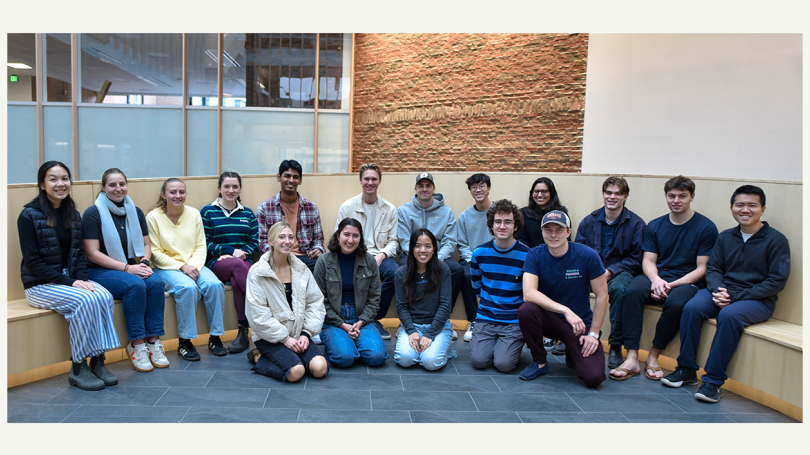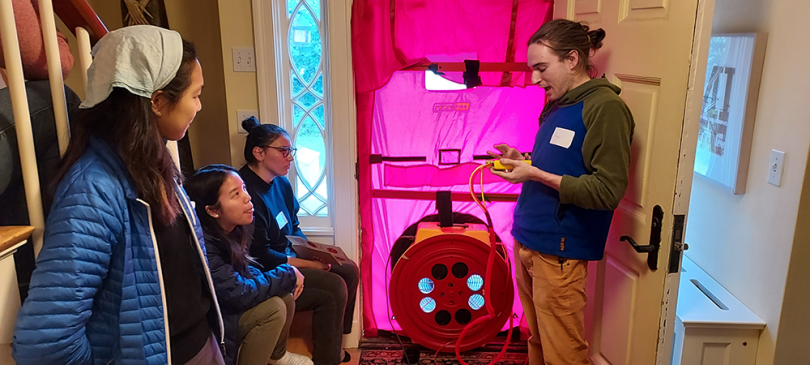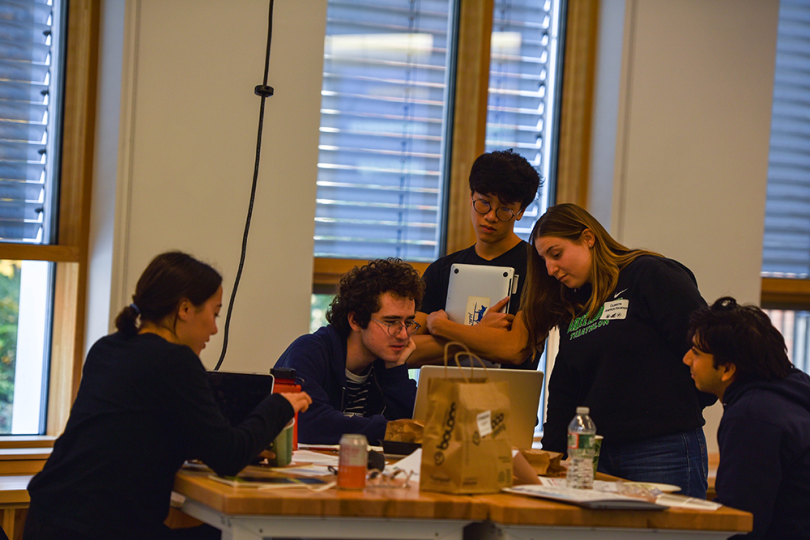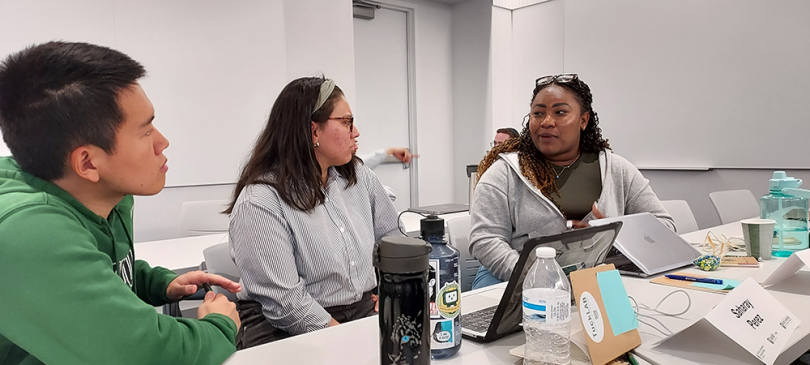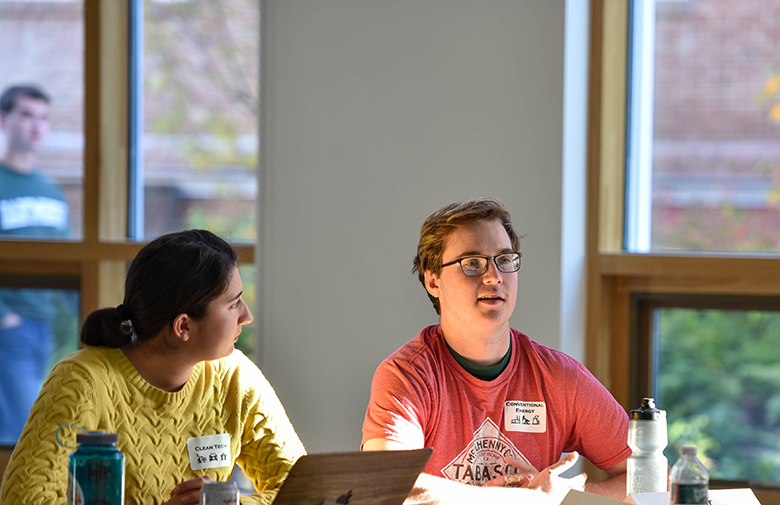Preparing Tomorrow's Leaders
Transforming our current energy systems to help create a more sustainable, equitable future and avoid the worst impacts of climate change is no small task. This critical effort requires wise policymaking, historic levels of investment, rapid technological innovation, widespread behavioral change, and a multitude of highly trained professionals who can lead climate and energy transitions across their companies, communities, and governments.
To help train these leaders, the Irving Institute for Energy and Society and Tuck's Revers Center for Energy, Sustainability and Innovation and Undergraduate Programs Office collaborated to create a new certificate program aimed at Dartmouth juniors and seniors: TuckLAB: Energy.
TuckLAB: Energy is the second venture in the Tuck Liberal Arts and Business (LAB) portfolio. Both the energy-focused program, and the first iteration, TuckLAB: Entrepreneurship, aim to provide undergraduate students from a variety of backgrounds and majors the business skills they need to leverage their liberal arts education in the competitive job market.
TuckLAB: Energy, which launched in September 2022, focuses on the particular challenges of the energy transition. It was designed to give students a multi-dimensional, interactive introduction to the complex landscape of energy systems and help them build their capacity to manage and lead energy transitions across all sectors of society as well as to gain a preview of potential energy-related careers.
"The energy sector is multifaceted by nature and the energy transition requires an interdisciplinary approach and hands-on experience," explained April Salas, Executive Director of the Irving Institute and outgoing Executive Director of the Revers Center. "It's not solely the domain of technology, finance, policy, or communications but instead requires all of the above — and more! Taking a cross-disciplinary approach and incorporating real-world exposure to the issues is a core Dartmouth strength and is foundational to how the Revers Center and the Irving Institute operate. This program is so exciting because of the partnership forged by Tuck, the Revers Center, and the Institute to team up to develop and lead this program."
Significant Student Interest
"There was clearly a big appetite among students for this kind of opportunity," said Dr. Amanda Graham, Irving Institute Academic Director. "We had nearly 40 Dartmouth students from 11 states and six countries, representing a wide range of majors — including economics, engineering, environmental studies, government, computer science, Latin American studies, and geography — apply for the first iteration of TuckLAB: Energy."
26 students ultimately enrolled, learning from energy experts, including Dartmouth faculty and alumni as well as leaders from across the energy and climate spectrum. The program offered a mix of traditional lectures and hands-on activities, from a design thinking workshop, to an onsite energy efficiency audit, to a UN climate negotiation-style simulation.
Career Possibilities and New Networks
TuckLAB: Energy consisted of eight sessions taking place over six weekends in September and October. "Spending one or two weekend days a week during term to participate in a co-curricular activity isn't a small lift for Dartmouth students who already have a demanding course load," noted Angus McReynolds, Irving Institute Undergraduate Education and Internship Coordinator, who helped run the weekly TuckLAB: Energy sessions. "But we were thrilled to hear that, overall, the students felt like they got a lot out of the program and that the significant time investment was worth it."
Post-program survey feedback from the students highlighted a number of areas that participants found particularly useful, such as illuminating potential career pathways:
"As I'm looking towards a career in this space, TuckLAB: Energy allowed me to pinpoint exactly what interests me in the massive, complicated challenge that is the clean energy transition—while also giving me the industry connections to pursue it," shared one participant.
An engineering student who enrolled in order to "learn more about the energy industry outside of the technology perspective" expressed, "I have a better understanding of the energy industry landscape. . . and a better understanding of how I want to contribute to it. . ."
For some, the program helped them connect with peers who shared their interest in clean energy and start to build professional networks: "I think the social element was important and that the intra-peer conversations have the potential to be super meaningful later down the line," observed one student.
Other participants found that TuckLAB: Energy helped them see a place for themselves in the energy transition. "The energy transition may be challenging, but it is definitely doable and there are so many people committed to it that it can't help but inspire you," wrote one student.
A Sense of Purpose and Hope
While the energy transition is indeed a monumental challenge that requires innovative programs like TuckLAB: Energy to help train the next generation of leaders, as one student put it, "We shouldn't lose hope and give into the doom and gloom because so many bright, compassionate, intelligent people are putting their entire lives into this issue!"
This sense of can-do optimism is in many ways the most essential part of the effort. "Climate change isn't an abstraction," noted April Salas. "It's happening now. Our students are keenly aware of this fact, and it's thrilling to see how, instead of giving into hopelessness or fatalism, they are stepping up to gain the skills and knowledge that help them better understand the energy and society systems of today, while focusing on tackling the challenges of tomorrow."
